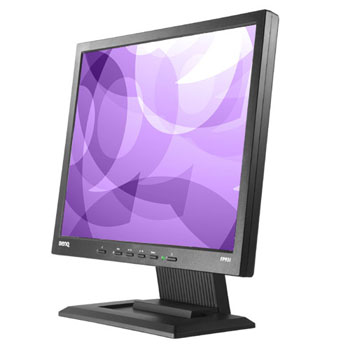A Guide to Choosing the Right 19" LCD Monitor - 7 Models Reviewed
by Kristopher Kubicki on November 30, 2004 12:04 AM EST- Posted in
- Displays
BenQ FP931
BenQ monitors are not something that we had a lot of opportunity to review in the past, but we picked up a sample a few weeks ago to include in today's roundup. There are a few similar Acer models to the BenQ that we are looking at today, but that should come as no surprise to those who know BenQ's history.
BenQ's FP931 doesn't bring much to the table as far as looks go, but it's under the hood that is of more interest to us. This is one of the few 19" monitors that we can buy through retail channels with 16ms response times, so we are extremely excited to see how the FP931 performs in a head-to-head competition for gaming.
| BenQ FP931 | |
| LCD | 19" SXGA LCD (Active Matrix) pixel pitch: 0.294mm Anti-glare coating |
| Scanning Frequency | Horizontal: 57-82kHz Vertical: 60-77Hz |
| Response Time | 16ms (Typical) |
| Contrast Ratio | 450:1 (Typical) |
| Compatibility | 1280 x 1024 (Native) |
| Brightness | 250 cd/m2 |
| Viewing Angle | 130 / 130 (Horizontal / Vertical) |
| Power | Working: 40W |
| Warranty | 3 years parts and labor |
| Interface | DVI 15-pin D-sub |
BenQ's FP931 is based on a TN 6-bit LCD panel. While it is advertised as a 16.2M color display, each pixel can only display 262,000 hues; the other 16M hues are "simulated" using dithering techniques. Over the last few months, AUO and BenQ have built a very strong dependence on each other, so we were very excited to see them working together on the FP931 display. In fact, our experience with the FP931 was very similar to our first impressions of the AUO-based Hitachi CML174. Aside from the obvious difference in size, these two monitors are very similar in performance and specifications. We already expect problems with rich color, but we may see better performance while gaming.
The rest of the BenQ design is very straightforward with no frills. The stand can be adjusted moderately with only a basic on-screen display. On one hand, the FP931 is a bargain around $430, but on the other hand, the problems with the 6-bit LCD panel have us worried.
BenQ advertises 7 dead pixels or 3 within 1 square inch for a return, and supersedes most vendors' return policies anyway. Of course, you could follow our advice and test the LCD before you even walk out of the store.










97 Comments
View All Comments
MAME - Tuesday, November 30, 2004 - link
thank god the dell 2001fp is the (2nd) best one here. I got it for $650 a few days ago on a whim. The reviews are kinda mixed but there's a 21 day return policy. Problem is, it's 21 days from the invoice and the expected shipping date would put the LCD in my hands AFTER that time. Thus, I couldn't return it even .1 seconds after receiving it :-/Alas, it seems the monitor is a good choice nonetheless and I should have decent product on my hands soon. My eyes can't wait!
Peter - Tuesday, November 30, 2004 - link
Because that's a barenaked LCD Panel, not a finished product?Azsen - Tuesday, November 30, 2004 - link
Hi, why does no-one have any information on this monitor:http://www.samsung.com/Products/TFTLCD/Monitors_n_...
19" 8ms response, 600:1 ratio
Peter - Tuesday, November 30, 2004 - link
Regarding the aspect ratio: If someone had taken the time to actually MEASURE, they would have found that all those LCD panels that sport a 1280x1024 resolution actually do measure 5:4, thus having correct aspect ratio at that resolution. Moot point, actually.(Running a CRT at 1280x1024 is wrongwrongwrong, though.)
Peter
ceefka - Tuesday, November 30, 2004 - link
#4 Jeff7181: LCD's use less power, take up less space (especially from 19" on) and produce less interference and heat. That times 2 if you are working with 2 screens. If a CRT works for you, then fine. It's not so much ignorance as it is choice.KristopherKubicki - Tuesday, November 30, 2004 - link
D0rkIRL: Thanks for the catch. Fixed.bookem dano: We know of the problem and we should have it fixed soon.
klah: I was only aware of Xbitlabs doing so. We feel that the methods for measuring reponse time thus far are OK, but not represent gray to gray response time measurements well. Its something we are working on and we will probably have a better methodology before the next roundup.
Kristopher
bookem dano - Tuesday, November 30, 2004 - link
For some reason while looking at this article, my cpu was pegged at 100%.I tried IE, Net, FIre, all same thing. Quite annoying.
carlivar - Tuesday, November 30, 2004 - link
OK so the tips at the beginning say to get a monitor with the correct aspect ratio such as 1280x960 resolution. I agree. Then all of the monitors reviewed (other than the Dell) have 1280x1024, which they specifically warn against.I know that most 19" LCDs are 1280x1024 but couldn't they at least have explained why this is?
And actually, why is this?! I don't understand the popularity of 1280x1024 instead of 1280x960! IT DOES NOT MAKE ANY SENSE.
Googer - Tuesday, November 30, 2004 - link
You will have to pry MY CRT from my cold dead hands before I let an LCD connect to my Graphics Card.klah - Tuesday, November 30, 2004 - link
"The TrTf response time is normally a pretty useless measurement - but it makes for an easy specification in which to market LCDs. "Why not provide us with a graphs of response times across the entire spectrum? There are at least 2 sites that do so now: X-bit and Tom's.